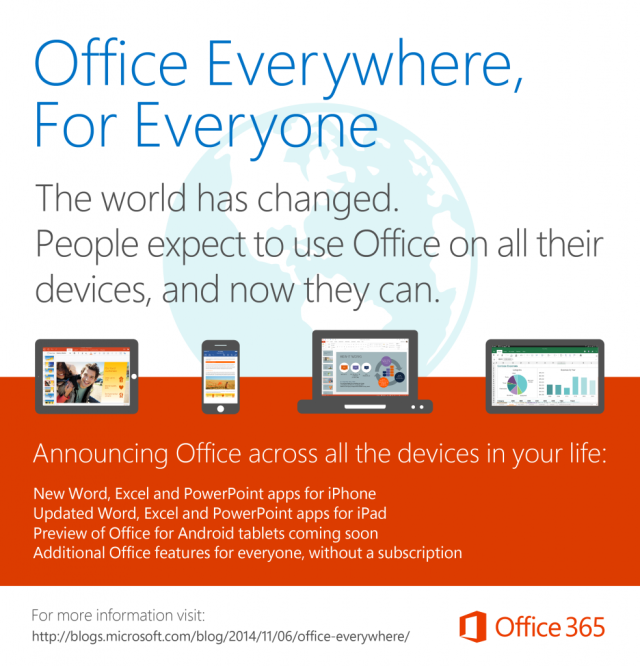
I remember how I felt about Word for iPad when Microsoft released it last year, a full four years after the first iPad came out: I actually like this OK, but it felt like too little too late. I dabbled a bit every time an update came out for a few months but I didn't actually make a switch.
Trouble is, I wasn't entirely satisfied with the various word processors I was using for work, either.
Here's my deal: I primarily use OS X and iOS from day-to-day, but I also use Windows and Android fairly frequently. I write at my desk but also at cafes where I go to keep myself from becoming desocialized like you do when you work from home for more than a couple of weeks. And I also knock out quick paragraphs and outlines and other thoughts on my phone or tablet, whether I'm in bed or on the train.
I needed something that could sync between all or most of these platforms, but it also needed to be reliable offline for the times when I had poor or no connectivity. All of this eventually needed to end up in WordPress, which was and is only too happy to insert a bunch of weird <p> and <span> tags into everything you paste in. The fewer formatting frills your word processor throws in, the better your text imports end up (and this was doubly true in WordPress 3.x).
And hey, ideally, I wouldn't hate using it too much. None of these needs were especially complicated, but they were very specific.
What I ended up cobbling together was a shambling Frankenstein's monster of tools. Most writing of short-to-mid-length posts (the bulk of my output) was done in OS X on TextEdit and synced between systems using either Dropbox or TextEdit, depending on what I was doing. Things written on the train or in bed were done in Notes or Google Keep and then pasted into TextEdit documents next time I was at the computer. The only time Word entered the equation is when I was working on TextEdit's RTF files in Windows.
Google Docs was out because WordPress didn't like the text it spat out and because its offline operation was spotty. Apple's Pages was out because it supported too few platforms and, also, WordPress didn't like it (this is a common theme). Word 2011 for Mac was slow and its OneDrive syncing felt tacked-on, because it was. Scrivener and Evernote were good for long projects, but Scrivener isn't great for Web writing (it handles hyperlinks particularly poorly) and they both just felt like Too Much for anything less than two or three thousand words (maybe I'm finicky, I'm OK with it).
The whole time I was figuring all of this out, the seed that was Office for iPad was slowly growing into a big ol' plant: first came Office for iPhone, then for Android tablets. Then more-than-serviceable previews for new Mac apps came out, and the same sort of preview has hit Android phones too.
These apps all support the same basic features, work pretty well offline, and can sync equally well with Dropbox and OneDrive (mostly OneDrive these days, since I have a Microsoft account anyway and my Dropbox space is being used for a lot of other things). Office wasn't new to all of those platforms, but in all cases the new versions were replacing apps that were either barebones or sucky or both.
The new Mac version of Word was the tipping point; I started using the preview just to kick the tires and then I never stopped using it. I didn't intend to do it, it was just a thing that happened. I worked through all my in-progress drafts in the old cobbled-together-TextEdit-plus-Dropbox-plus-whatever system and eventually all my new in-progress stories lived in Word documents.
I used Word in college and a little back in my life as an IT person, but as I gravitated away from being an all-Windows user I also gravitated away from Office. The old "first and best on Windows" Microsoft really wanted me to buy into its entire ecosystem to use the best/only versions of its products, and that was incompatible with my (and many others', I assume) increasing use of iOS and Android and OS X.
The new "let's publish our applications in places where users are actually going" Microsoft is easier to live with and, paradoxically, has gotten me to buy further into the Microsoft ecosystem than I ever would have done otherwise. For any person or group of people who needs to use the same tools on a diverse mix of hardware and software platforms, in the last year Office has gone from being a non-starter to a surprisingly viable option.
So yes, Microsoft didn't make it to the iPad or to any of these other platforms as quickly as it could have or should have. There will be people, including some at Ars, who found other non-Microsoft solutions that worked for them in the meantime. But I find myself revising my initial "too little too late" stance to something closer to "better late than never." A subtle distinction, maybe, but an important one.
reader comments
183